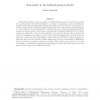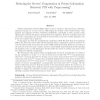1640 search results - page 10 / 328 » Deriving Private Information from Randomized Data |
129
Voted
SDM
2008
SIAM
15 years 3 months ago
2008
SIAM
In this paper we explore private computation built on vector addition and its applications in privacypreserving data mining. Vector addition is a surprisingly general tool for imp...
133
click to vote
CISC
2008
Springer
15 years 3 months ago
2008
Springer
One of the important applications of digital signature is anonymous credential or pseudonym system. In these scenarios, it is essential that the identity of the signer is kept secr...
TCC
2010
Springer
15 years 10 months ago
2010
Springer
We study rationality in protocol design for the full-information model, a model characterized by computationally unbounded adversaries, no private communication, and no simultanei...
98
Voted
PVLDB
2010
15 years 6 days ago
2010
Random perturbation is a promising technique for privacy preserving data mining. It retains an original sensitive value with a certain probability and replaces it with a random va...
111
Voted
CRYPTO
2000
Springer
15 years 6 months ago
2000
Springer
Private information retrieval (PIR) enables a user to retrieve a data item from a database, replicated among one or more servers, while hiding the identity of the retrieved item. ...


